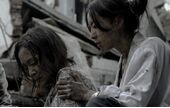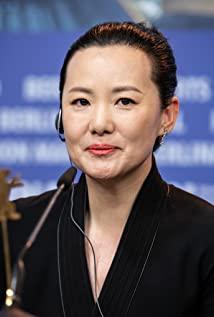I have to say, "Tangshan Earthquake" is actually a very good story. It uses a family of three for decades to gather such a neat entry point to describe the changes of an era in a small way, with a slogan of 23 seconds and 32 years. , enough to see how ambitious Feng Xiaogang is this time. Putting aside the placement of advertisements and the moderate rewriting of the original characters, it is understandable to make such a decision as a film with strong commercial demands under my country's current censorship system. But looking at the whole film, the play still seems to be far from solid and detailed.
For example, in the Sino-American co-production "Kung Fu Dream" released in the previous paragraph, the first shot is the height scale carved on the pillar of the house in the hometown of Derui, the hero of the United States, slowly climbing up from the bottom, dropping his teeth for the first time. When my father died and finally moved to China, the background of all the characters in the story was clearly explained. This is an assembly line produced by Hollywood’s industrialized film system for decades. It is simple, refined and effective, making it easier for viewers to understand the psychology of the characters, making the characters appear richer and more credible. We often say that details determine the success or failure of a story, but "Tangshan Earthquake" is obviously not enough on this point. In the conversation before Zhang Jingchu's adoptive mother died, most people knew that she was a nurse before, and Zhang's choice of university to study medicine must have had an impact, and this way, it only took one shot or even half a shot to explain clearly and dig deeper into the characters. Things in the inner world were simply ignored. The lack of details of such characters abounds in the film, which makes most of the characters' motives appear deliberate and ambiguous. Why did Zhang Jingchu leave for a few years because he was so grateful to his adoptive parents, how did Li Chen leap from pulling a cart to a business owner, Lu Yi The role played can even be said to be masked to the point of wishful thinking. In fact, these intentional words only need a few shots. And in the film, we can see that Feng Xiaogang is more accustomed to using dialogue instead of the camera to explain the background and psychological state of the characters. Although several actors used their excellent acting skills to support the story, so that the characters will not be too pale and flat, but the details The lack of description and the overall rhythm control of the play is too neat and evenly divided, which still greatly weakens the tension of the entire film.
The more serious problem is the language of the shots. First of all, let’s talk about the big scene. The earthquake in the opening paragraph is the focus of the whole film’s publicity and the most important scene. It is a pity that from this clip, Feng Xiaogang's ability to control the big scene is obviously insufficient. He uses too many medium and close shots, and lacks the outline of the environment from the panorama and long-range, so that it is difficult for you to have an impression of the environment background of the whole story. At the same time, the shot scheduling during the earthquake is too dead. In modern commercial films, we often use the rapid cross-switching of bipolar lenses to enhance the impact of the image in large scenes. This is not uncommon in foreign commercial films and the effect is good, but you can hardly see it in "Tangshan Earthquake" Such a visually shocking picture, too many smooth, steady and well-established medium and close-up shots make this big investment clip, which is hyped in publicity, somewhat lukewarm in terms of visual effects.
Then let’s talk about the axis. Although modern movies often don’t pay much attention to the axis, in the “Tangshan Earthquake”, the axis relationship in the dialogue scenes is frequently misaligned (the most obvious is the three-person dialogue scene, such as Chen Daoming going to Zhang Jingchu’s bedroom, etc. ) and the skip axis also significantly reduced the smoothness of the image. Another is that the camera is too dead, lacking the scheduling of sports shots and the idea of montage inside the camera; too many skill transitions are used in the connection between the scenes, which makes the film feel too strong; as mentioned earlier, Feng Xiaogang loves it very much. The use of medium close-ups, the lack of panoramic long-range views, and the use of bipolar lenses result in insufficient image strength. Probably these are the habits he developed in the filming of urban jokes before. But the more serious problem is the lack of space. I believe that most people have an impression of the interior space of several important scenes in the film (such as Xu Fan's house and Chen Daoming's house) after watching the film. How many people know before watching Zhang Jingchu push the door Xu Fan's kitchen is outside? What was the specific environment around the protagonist's family before the earthquake? How much damage was done to the city of Tangshan during and after the earthquake?
These may seem insignificant to many, or even nitpicky, but the lack of detailed descriptions in a well-invested commercial luxury production can almost be called a disaster. Sometimes when we watch a movie, we often say that we can see the sincerity of the director and the crew. Where does this so-called sincerity manifest itself? In fact, it is in the deliberation and consideration of these small details that it is enough to let people see how much attention the director has. That is, starting from the lack of these most basic image control, many people criticized "Tangshan Earthquake" as more like a 150-minute series, but lacking the so-called movie quality.
For example, "Tangshan Earthquake" was originally a good piece of ingredients, but Feng Xiaogang, who was used to making Xinjiang meat skewers on the street, hurriedly baked it on a charcoal fire. Although he chewed it, he could barely eat it. You know that if you add proper seasoning and cook it more carefully and rationally, it may become a superb dish that has been passed down for centuries, and the result of such a waste of treasure in the end has to make people sigh.
Finally, let’s talk about something completely unrelated to the movie. When Wenchuan was still in the imperial capital, I went to school. One of my classmates was a gentle girl, who seemed rather weak on weekdays. At that time, her boyfriend was filming near Sichuan. After the earthquake, his mobile phone and the hotel he was staying in couldn’t make calls, so he decided to buy a plane ticket and flew over immediately. Fortunately, it didn't take long for her to find the man. He also narrowly escaped during the earthquake, and then found out that his girlfriend was willing to risk the aftershocks to travel thousands of miles to find him. Embrace each other and promise not to separate again in this life. I originally thought that after experiencing such a life-and-death catastrophe, the pair would have an ending, but a few months later, I heard that the two broke up. After a side attack, I realized that the reason was probably because of some problems with the house, car, and childbirth after marriage.
So many times I think, no matter how vigorous the love is, it will not be able to withstand the torture of the world.
View more about Aftershock reviews











